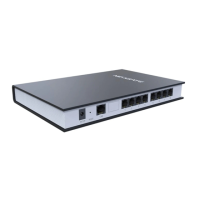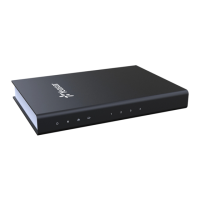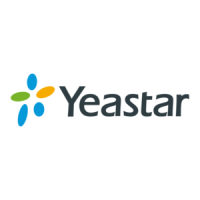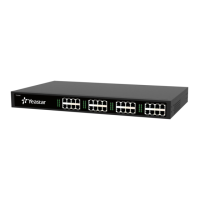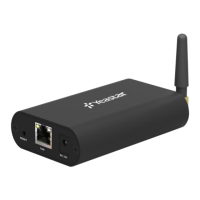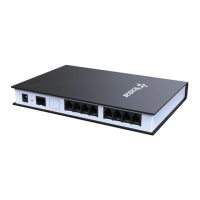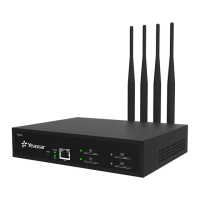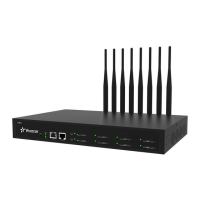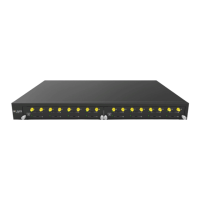Do you have a question about the Yeastar Technology TA410 and is the answer not in the manual?
Key functionalities and benefits of the Yeastar TA410/810 Analog VoIP Gateways.
Describes how to connect IPPBX with TA FXO Gateway using different modes.
Configuration mode for connecting TA410/810 to a SIP server via a SIP account.
Configuration mode connecting TA410/810 to a SIP server by registering it as a VoIP trunk.
Recommended mode for connecting TA410/810 to a SIP server using a Service Provider SIP trunk.
Describes connecting TA FXO Gateway to FXS Gateway using SPS/SPX Mode.
Steps to access and log into the TA410/810 web interface.
Overview of system status, including trunk, network, and system information.
Displays the status of FXO ports, VoIP, and FXO interfaces.
Shows the IP address and status of the LAN port.
Provides hardware/firmware version and disk/memory usage.
Access call logs, system logs, and packet capture tools for system debugging.
Captures detailed call information like time, caller, callee, and duration.
Allows downloading and deleting system logs for troubleshooting.
Integrates Wireshark for capturing and analyzing network packets.
Configure network settings including LAN, VLAN, VPN, and DDNS.
Configure static IP, DHCP, or PPPoE settings for the local network.
Manage access methods like SSH, FTP, TFTP, HTTP, and HTTPS.
Configure Virtual LAN settings to segment the network.
Configure VPN settings, supporting OpenVPN client mode.
Configure Dynamic DNS to access the network using domain names.
Set static routes for directing network traffic through different gateways.
Manage firewall, service access, port security, and alert settings.
View and access firewall configuration and alert settings.
Configure system alerts via phone or email for attacks.
Configure Asterisk Manager Interface for system monitoring and management.
Upload certificates for TLS trunk support.
Configure firewall rules, common rules, and auto-defense.
Set rules for IP addresses based on packet acceptance speed.
Configure password, date/time, email, auto-provision, firmware, backup, and reset.
Change the administrator login password.
Set the system's date, time, and time zone.
Configure SMTP settings for sending system alerts via email.
Configure methods for automatic device provisioning (PNP, DHCP).
Update the device firmware using a TFTP Server or HTTP URL.
Back up and restore device configurations and custom prompts.
Options to reboot the system or reset to factory defaults.
List and configure FXO ports, including general and call duration settings.
Details of FXO ports, including gain, impedance, and call duration.
Group specific PSTN trunks for route selection.
Configure VoIP trunks (SIP, IAX) for integration with IPPBX.
Set up Account, VoIP Trunk, and Service Provider trunks.
SIP account created in TA410/810 for registration by other devices.
Configure SIP trunk to register with a SIP provider.
Configure peer-to-peer trunks authorized by IP address.
Group specific SIP trunks for selection within routes.
Configure general SIP parameters, NAT, Codecs, QoS, Response Code, and advanced settings.
Basic SIP registration and port settings.
Configure NAT traversal settings using STUN.
Select allowed audio codecs for VoIP communication.
Configure Quality of Service parameters for VoIP traffic.
Customize SIP response codes for call status.
Configure advanced SIP parameters like caller ID and session timers.
Configure IAX2 trunk settings for Internal Asterisk Exchange protocol.
Configure IP->Port and Port->IP routes for call control.
Configure routes for calls from SIP server to FXO ports.
Basic configuration for IP->Port routes.
Detailed configuration for IP->Port routes with advanced matching.
Configure routes for incoming calls to PSTN trunks or SIP server.
Basic configuration for Port->IP/Port routes.
Detailed configuration for Port->IP/Port routes.
Block incoming or outgoing calls by adding numbers to the blacklist.
Configure callback feature for specific numbers or all numbers.
Configure general gateway preferences and voice settings.
Set maximum call duration, encoding rate, and FXO mode.
Manage custom audio prompts for the gateway.
Upload, download, and manage custom audio prompts.
Configure advanced settings like tone zones and DTMF signals.
Configure pre-programmed or custom tone zones for FXO ports.
| Ports | 4 FXS Ports |
|---|---|
| Power Supply | DC 12V/1A |
| Type | Analog Gateway |
| Network Interface | 10/100 Mbps Ethernet |
| Protocols | SIP |
| Transport Protocol | TCP/UDP |
| Codec | G.726 |
| Network | IPv4, IPv6 |
| Fax over IP | T.38 |
| Operating Temperature | 0°C to 45°C (32°F to 113°F) |
| Storage Temperature | -20°C to 70°C |
| Humidity | 10% to 90% non-condensing |
